“Whatever you do, it will be for the best!”
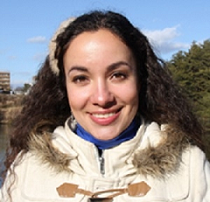
Name:Anastasia Pustovskikh
Nationality: Russia
Research: Peace Education
Graduate School:Learning Development Major, Graduate School of Education
Hobbies:Yoga, Salsa Dance, International Communication, and Traveling
Thank you very much for making the time to see us. I was surprised to hear that you are from Khabarovsk and I think that it is quite unusual. In Japan, we still know only few about Russia. When did you come to Japan?
I came in April 2009. As of this April, I have been here for just 2 years, but I came several times to Japan before 2009. For example, I was in Japan for a short stay as a member of the Japan-Russia Student Conference, and as an interpreter for a group of children in Aomori. Aomori Prefecture has signed affiliation agreements with the Region of Khabarovsk. Every year, a group of children come to Japan for exchange.
What was your first impression of Hiroshima?
Saijo is my favorite town. When I go to Osaka or Tokyo, I get very tired. Saijo is great! Some parts of Hiroshima City are very similar to Khabarovsk. Somehow, I feel at home. I really like Hiroshima. The town is large, the people are friendly, and you can walk around alone without problems. I feel comfortable and relaxed.
How is Khabarovsk?
Compared to Moscow, it’s a small town. The population is about 600,000 people, but Khabarovsk is very beautiful. The town is on the shores of the Amur River. Across the river is China. The Amur River is the boundary line between the two countries. In Khabarovsk, The Amur River is as wide as 2-3 kilometer and it is one of the biggest rivers in Russia.
It’s really a wide river!(I’m looking at the map)And it’s close to Japan too!
That’s right. It’s close to both China and Japan. That’s why it takes only two hours to Niigata by plane. Since last year, we can get direct flights to Tokyo. Japan is really close to my hometown. Everybody is surprised to hear that.
Are there any Japanese in Khabarovsk?
Yes, there are. There are Japanese companies and a Japanese Consulate General. Every year, Japanese teachers come to the Far Eastern State Humanities University, my alma mater.
What did you study at university?
My major was Japanese and English language teaching so I studied Japanese language, English language, and education.
Why were you interested in the Japanese language?
I first came to Japan I was 11 years old. Just at that time, Khabarovsk and Niigata became sister-cities and there were a lot of exchange programs and such. My first visit to Japan was to take part in such a program. At that time, I was very surprised about the differences between the Japanese and Russian lifestyles. I didn’t know that Japan was such a beautiful country. I also enjoyed a homestay, but except for some easy words, I almost couldn’t speak any Japanese. But I was happy when I was able to understand even a single word. So, it was very difficult to communicate and I decided to learn Japanese. Although I started to study it at the age of 11, it is still difficult for me.
Your Japanese is very good! You said that you started to study Japanese at 11. Were there any schools where you could do that?
Yes, there were. At my school, it was possible to learn Japanese. It was a “Gymnasium”, you know. Although, in general, the curriculum is similar to other schools, its level is higher because normal schools offer only one foreign language. At Gymnasium, you can study a second foreign language or you have two first foreign languages. You had a broad range of things you could study, and we could study at the same place from Elementary School through Junior and Senior High School.
When you came as an interpreter during your college days, did you think about studying in Japan in future?
No matter how hard you study a foreign language in your home country, it would be impossible to master it without having a chance to go abroad. I went to Japan several times, but I wanted to stay here to study in my own specialized field. Although I had some idea about Japanese culture, I realized that reading books is not enough. Many things you have to see by your own eyes to understand them. This year, I was invited by a friend and had the opportunity to experience a Japanese style New Year’s Festival for the first time. I was very happy. I had heard about traditional New Year’s food called Osechi. All the same, when I saw and ate it, I felt that it was completely different from what I thought. Studying in Japan was my dream, so I’m really happy.
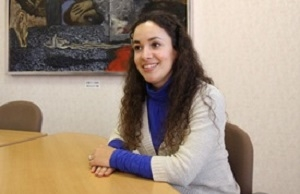
Why did you choose Hiroshima University?
I came to Japan two years after graduation. I worked as an adviser for foreign students at the Japanese Consulate General and as a Japanese teacher at the evening school of the university etc. Actually, Hiroshima University is quite famous not only in Japan but also in Russia. It is a historical university, famous for its high level of education. That’s why I came here. It was a program by the Ministry of Education, Culture, Sports, Science and Technology, but I had to find my tutor by myself. I sent many e-mails to several universities. Professor Yumiko Suzuki from Hiroshima University replied immediately, so I decided to take the opportunity and come to Hiroshima University! I was very happy. That was two years ago, but it seems as if it were last month.
What kind of research are you doing now at Hiroshima University?
I’m studying in the Learning Development Major at the Graduate School of Education. My research is related to Peace Education. After coming to Hiroshima, I visited the Peace Memorial Park and the Peace Memorial Museum several times. In Russia, Peace Education is almost unheard of. I think it is nearly impossible to explain it to my Russian friends. I have been looking for a good Russian translation for Peace Education for a long time. I think it is my mission to introduce it. Also, because my major at my university in Russia was pedagogics, if possible, for educational material for children, I would like to make teaching material for Peace Education. At the moment, I’m not producing learning material yet, but I want to make at least worksheets. It’s very interesting. I start with a pilot survey. I ask Russian and Japanese children “What’s peace?” and “What’s war?” and about their images of it. As expected, the way of thinking and image were different. Although there were some resemblances, there were also big differences. Japanese Peace Education would be good for Russians, but I’m thinking about how to adjust it to the Russian way of thinking. It’s difficult, but interesting.
What’s the difference of consciousness between children in Russia and Japan?
For example the image of peace is different. Japanese children have a quite practical image of peace. They describe peace specifically with hearts and paper cranes. But Russian children think more broadly about it. They connect peace with love, respect or harmony.
That’s interesting!
But there are also surprisingly common points. I expected that their images wouldn’t coincide at all, but I found similarities such as love, family or blue skies. But the percentage is different. Oh, I’m sorry to give you a lecture! (laugh)
Peace is an individual value and nothing being taught by a teacher, isn’t it? So what kind of educational material do you want to make?
My dissertation topic at my university in Russia was “self-learning”. I didn’t just want to drill the students. I used work sheets and tried to make them think. For example, I would like to give them thought-provoking questions or to remind them of their own experiences and asking them about their personal opinions. I want to offer a forum for active discussion among various kids. Peace is more than absence of war. Peace also means to develop one’s vision of peace, which exists from one’s earliest childhood, and not to quarrel with each other. There are many different ways of thinking. That’s what I want the Russian children to consider. Also in Russia, there are thought-provoking lessons, but very rarely about peace. You know, we have completely different notions about that. In Japan, especially in Hiroshima Prefecture, there is a message of peace. That’s why everybody has an idea what should be done do to achieve peace. But Russia still has an army, and it’s difficult to say that the national consciousness is peace-loving. Russian children believe that the army is necessary to keep global peace. I want to change that, but it won’t be easy.
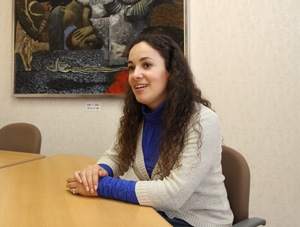
Is the Japanese vision of peace so hard to translate in Russian?
I think that the translation itself is not so difficult. But there are different patterns of consciousness, so you can’t translate it directly. To be understood, it probably has to be in line with the thinking of the Russian people.
You speak Russian and Japanese so well, and you are able to understand the Japanese idea of peace too. So it should be possible for you to introduce it to Russia, shouldn’t it?
Yes, it should! But I’m still studying, and I have no confidence to teach peace yet. I have one more year left. At first, I thought that the master’s program wouldn’t be enough and I wanted to study longer and go on to the doctoral program. But then I became afraid, that I would forget what I learned when I’m not teaching it. I think it would be better not to go on to the doctoral program, but to go back to Russia and to pass along and teach what I have studied here. I have to teach now, while I’m still young and while I still have enough energy to do that! (laugh)
I think you are busy studying, but how do you enjoy your college life when you’re not researching?
College life is fun! I also enjoyed it in Russia, and I’m happy to have the opportunity to go back to those good old school days in Japan. There are many things only students can do. That’s why I’m taking part in many activities. For example, I do yoga, salsa and I go to elementary schools to introduce Russian culture and play Russian games together with the kids, which is a lot of fun. I’ve also worked as a TV reporter.
What kind of work did you do as a TV reporter?
There was a TV program called “Let’s Higashi-Hiroshima”. TV reporters go to many places and introduce festivals or social life. Higashi-Hiroshima is large and there are several locations where you can’t go without a car. So, this program was a change for me to visit such places and I was very lucky. For example, I went to Akitsu, where potatoes and oysters are very famous. And it’s fun to directly meet people living in Higashi-Hiroshima, to hear Hiroshima dialect and also to communicate with old men and women. Not every student has that opportunity. I had no confidence in my Japanese, but everyone was very kind and it was easy to break the ice in just a short time and become friends. I really like to meet a lot of different people, and every day I say to myself: “I hope today will be a great day! I wonder whether I’ll meet someone new today.” That may be strange. (laugh)
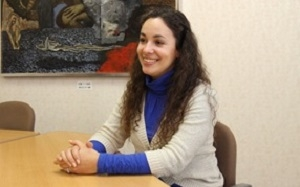
That’s very nice! It makes me happy, too!
Also when I was in Russia, I didn’t like to be in the same place all the time. That’s my character. That’s why I took part in the exchange project when I lived in Khabarovsk. At first, when I came to Japan, I was worried whether I could find any activities to take part in, but now I live a very active life. When I have time I like to travel, mostly by bus or other cheap means of transportation. I want to go to many places as long as I’m in Japan.
I’m glad that you enjoy your life in Japan so much. What kind of advice do you have for students who plan to study overseas?
The first week after I came to Japan, I was homesick and thought that couldn’t manage it. But the most important thing is to open your heart. Then you can make a lot of friends and your life will be full of fun. It doesn’t matter whether your period of stay is 3 months, 6 months, 1 year or even 3 years. Have fun as long as you’re here. This is my advice. Take advantage of your opportunity and meet many people, go to many places and feel that your “life in Japan is fun”, that “you are happy” and “you are lucky to be in Japan”. I recommend this attitude not only students living in Japan. Anywhere in the world it is the same for international students. But Japan has such a fantastic culture, young and old are friendly wherever you go, smile and welcome you. That’s why I want everyone to be happy to have the chance to come to Japan.
Nowadays, Japanese students think that they don’t have to leave Japan to have fun and that they should concentrate on job hunting. Many of them are said to be inward-looking. Do you have a message you would like to direct to them?
I can understand their feelings well. After graduation, I immediately started to work and was yearning for a stable lifestyle. When I decided to go to Japan, I was worried about my future and whether I could find a job after I’ll be back to my home country. I think that’s natural. When you live in your own country for the whole time, you may believe that you know everything about its culture, but when you go abroad, you realize that there are still things you don’t know yet. It is my first time to stay so long in Japan and people of all kind of nationalities asked me various questions such as: “How is Russia?” or “Is it true what we saw on the news?” And became aware that there is so much about my culture and home country I don’t really know yet. As an international student, I can enjoy new experiences and a new way of life, and I paused to realize that I’m able to compare my home country’s culture with that of my overseas study destination. Not only good aspects, but also aspects to be improved only become visible when you go abroad and are able to compare. Therefore I recommend that you study overseas, even if you feel apprehensive about it. There is a popular proverb in Russian which I really like. It says as follows: “Whatever you do, it will be for the best” (In Russian: Всё, что ни делается - всё к лучшему)
It means that you will make better experiences and that things really can happen for the best. When you think like that, you can move mountains!
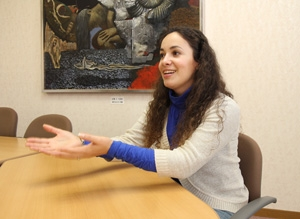
Thank you very much for your great advice and message. It made me feel happy, too.
You’re welcome. Thank you very much.
Photo Gallery
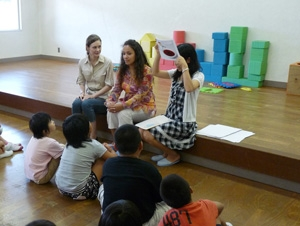
Volunteer Activity

TV
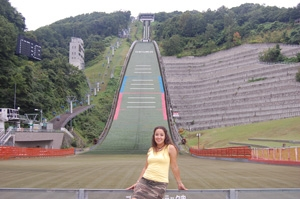
Hokkaido
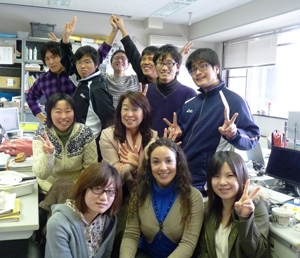
Campus Life
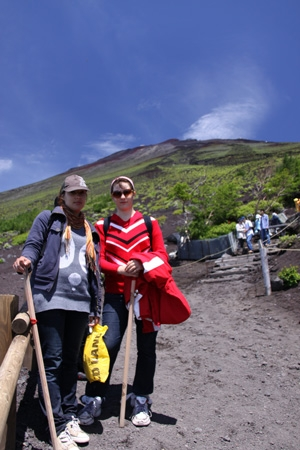
Mt. Fuji


 Home
Home